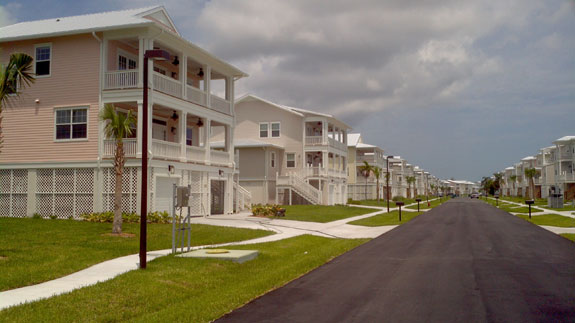
Senate Bill 354 gives millions of dollars in property-tax exemptions to UK-based Balfour Beatty Communities for its development and ownership of this U.S. Navy housing community in Key West. (Photo by Chris Carson/U.S. Navy.)
By Steve Miller
Florida Center for Investigative Reporting
It started with a simple property transfer in 2007 in Key West: The U. S. Navy moved ownership of some property to its private housing partner, Southeast Housing. Monroe County declared later that the land was no longer absolved of taxation as part of U.S. government immunity and laid a $11.5 million tax bill on Southeast and its UK-based ownership, Balfour Beatty Communities.

Naval Air Station Key West is located on Boca Chica Key, four miles from the Key West business district. (Photo by Trice Denny/U.S. Navy.)
The bill is being contested by the developers in a local court.
A bill passed last week by the state Senate aims to nail down the law on tax-exempt status of military housing providers. The legislation targets the situation in Monroe County.
Senate Bill 354 gives millions of dollars in property-tax exemptions to Southeast and its foreign parent company. It also amends the state statutory definition of what can be called government property for the purpose of tax exemption, allowing “quasi-government” agencies to be exempt from taxation.
The bill includes an amendment that requires the property owner to pay the taxes if the land houses civilians.
As if the expansion of the public-private relationship isn’t enough, it gets stickier.
Southeast is hoping to sell part of the land from the 2007 transfer to a private developer. But with a lien, it’s a tough sell.
If the House passes its companion bill and Gov. Rick Scott signs the measure into law, the back taxes owed would be winnowed down to about $1.7 million, as an amendment to the legislation allows taxation only on parcels that are used to house non-military dwellers.
But the tax bill was filed by the county after discovering that Southeast was leasing to non-military tenants, which this editorial from the Florida Keys Keynoter points out:
So long as the military housing was occupied by active-duty military, the issue of property tax exemption never arose. However, as Balfour Beatty began to renovate and rent out those former military units to non-military tenants, that triggered a review by then-Monroe County Property Appraiser Karl Borglum.
In the case before Audlin, the Property Appraiser’s Office argues that Southeast Housing LLC is “not an exempt entity. The use of the property, leasing of the housing to active military and non-active military and civilian tenants is not a recognized exempt use.”
Balfour Beatty is a multinational company with construction, infrastructure development and a number of other operations around the world. In many cases, companies that are headquartered in other countries provide services to the U.S. government. Balfour Beatty has also purchased companies that have federal contracts. Balfour Beatty Construction, which is based in the United States, used to be Centex until 2007, for example. Balfour Beatty, while based in the United Kingdom, has a number of U.S. arms and operations, such as the one in Key West.
U.S. Rep. Joe Garcia, D-Miami, whose district includes the Keys, sent a letter last week to Ray Mabus, Secretary of the U.S. Navy, protesting the idea of tax amnesty for Southeast Housing/Balfour on any level. Garcia told Mabus that a private, for-profit developer should have to pay taxes, as it enjoys the same infrastructure and other services its tax-paying peers do.
In an interview with the newspaper in Marathon, Garcia said:
The taxpayers of Monroe County deserve better. Why can a foreign company hire Tallahassee lobbyists and get special treatment and pay no taxes? That’s wrong and that is why I am involved. I will make our case to the Navy, write the governor and the legislators. We need to shine a big, bright light on this. I will do my part to keep the pressure up and get them to pay their fair share.
Records show Clark Smith of Fearington & Smith as a registered lobbyist for Southeast Houston for the past two years, but with no lobbying activity on his reports.
Balfour has numerous public-private partnerships with the U.S. Navy, including housing developments for military members in Connecticut, New York, Maine, Rhode Island and New Jersey in the East and Texas, Mississippi, South Carolina and Florida in the South. It operates under a federal act from 1996 in which the government makes numerous fiscal guarantees to private vendors in exchange for keeping military housing “suitable.”
Southeast owns large tracts of property in several counties in Florida, including Escambia, where in 2007 it took ownership of millions of dollars worth of property from the Navy, as it did in Key West. The agreement looks like this.

